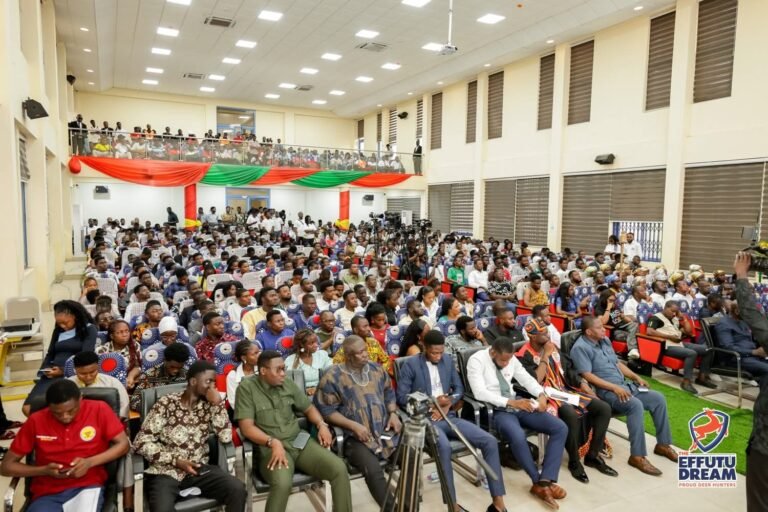
Bright Philip Donkor
A print media practitioner, Bright Philip Donkor, has called on all individuals eyeing the New Patriotic Party (NPP)’s flagbearer slot ahead of the 2028 general elections to exercise restraint, and uphold the unity of the party. According to him, “ambition, while legitimate, must be regulated for the greater good of the NPP”.
Speaking during an interview on Asaase Radio 99.5’s Press Pass programme on Wednesday, June 11, 2025 — which focused on the topics “NPP Internal Elections: Aspirants Defy No-Campaign Directive” and “GRNMA Strike Cripples Health Services”, Mr. Donkor expressed concern over the subtle signs of premature campaigning among some NPP members despite a clear party directive prohibiting early jostling for leadership.
“Let’s be honest — every would-be NPP flagbearer aspirant wants to secure their base early. So, what we’re seeing isn’t surprising. But they must respect the foundational unity of the NPP. The party is bigger than any individual, and many have sacrificed for it. So, we must keep the NPP strong in all things,” Mr. Donkor stated.
Unregulated ambition
Mr. Donkor, who is also the Founder of the Briphildon Foundation, a non-governmental organisation, emphasised that the current period should “be one of sober reflection and healing following the party’s electoral defeat in 2024, not a time for open or coded power struggles”. He acknowledged that visibility is an essential currency in politics, but cautioned that unregulated ambition, especially in opposition, could deepen cracks within the party.
“Politics thrives on visibility, and once aspirants smell opportunity, especially in a party out of power, silent campaigning is inevitable. But NPP cannot allow defiance to take over. It could damage the party’s 2028 prospects,” he cautioned.
Mr. Donkor further cautioned that if internal competition continued unchecked, it risked weakening the party’s internal cohesion, and could erode public confidence in its ability to govern.
“If this trend continues, it could widen internal cracks. Ghanaians are watching — if the NPP looks chaotic internally, how can it be trusted to govern nationally again? And in view of current developments, and to prevent a repeat of some of the actions by flagbearer hopefuls that caused problems for the party during the last elections, I urge the party’s leadership to quicken its pace towards organizing the flagbearership elections,” he said.
Culture of discipline
Mr. Donkor, who serves as the news editor of the Daily Statesman, urged aspirants and their supporters to embrace a culture of discipline, patience and strategic engagement, stating that the “success of the NPP in future elections will depend not only on its policies but also on how it manages its internal affairs”.
“My advice to all individuals who will be considering to contest as NPP flagbearer aspirants: let’s all respect the spirit of party unity. There’s time for healthy competition, but now must be about reflection and strategy. The NPP needs healing and focus, not premature showdowns. True leadership shows in restraint, not in loud engagements or coded endorsements,” he said.
Mr. Donkor further noted that the ongoing disregard for the party’s no-campaign directive was not just an issue of individual misconduct, but a broader test of the NPP’s internal discipline and resilience.
GRNMA impasse
Touching on the nationwide strike action by the Ghana Registered Nurses and Midwives Association (GRNMA), which continues to take a heavy toll on the country’s healthcare delivery, Mr. Donkor called on the National Democratic Congress (NDC) government to adopt a more conciliatory and respectful approach towards the demands of nurses and midwives. He indicated that any attempt to indirectly silence the health workers in respect of articulating their grievances and demands, or engage in a confrontational “tug of war” with them could worsen the crisis and further undermine public trust in the health system.
“This is a complex issue. Nurses and midwives are indispensable to Ghana’s healthcare system. Their importance goes far beyond bedside care; they are the backbone of primary healthcare delivery and the frontline defenders of our public health. And so they’re striking for a reason. They are striking for dignity, safety, and fairness and they have every right to do that.
“In the first place, it is unfortunate that the Health Minister and the government would respond to this crisis by calling on retired nurses and midwives to volunteer their services. That move was not only dismissive of the concerns raised but also counterproductive,” he said.
Walking the talk
Mr. Donkor also emphasised that resolving the crisis required more than stopgap measures. He called on the government to engage in meaningful dialogue, demonstrate empathy, and respond decisively to the legitimate concerns raised by the GRNMA.
“The government must listen. The government must respect. And most importantly, the government must act. These are not political demands, they are professional and humanitarian ones. The way to resolve this health impasse is not through coercion or neglect or demonstrating any form of governmental superiority, but through cooperation and genuine commitment to the welfare of healthcare workers,” he added.
Normalising periodic strikes?
He further stressed that Ghana could not afford to normalise periodic strikes in the health sector. According to him, institutionalising proactive engagement with health unions, honouring collective agreements, investing in the welfare of nurses and midwives, and avoiding the use of political lenses in addressing such issues, were key to preventing the recurrence of industrial actions.





